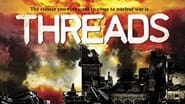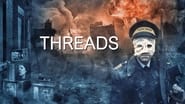Chris_Lacon
It's a true testament to a films impact and power, when its narrative and its images stay with you for years or even decades after its release. It's even more impressive when a television movie, often resigned as cinema's lesser equivalent, manages that same feat despite lower budgets and lesser known stars. "Threads" shot on a shoestring budget of between £250 to 350,000 and first broadcast on 24th September 1984, is one of the few television films that transcends its medium and in many ways, surpasses even cinematic features in its depiction of apocalyptic events. It also say's a considerable amount when, despite relatively few repeats, it's visceral, grotesque images still stay with its viewers more than three decades after its original broadcast."Threads" similarly to its American predecessor "The Day After", released a year before, depicts the events leading up to, during and after a Soviet-American nuclear war and the resulting social, medical and psychological breakdown of society. Unlike "The Day After", which shows up to a few weeks after the nuclear exchange, "Threads" shows what would happen 10 years following the attacks, allowing for a greater perspective on the aftermath. That, in my opinion, is why "Threads" packs a far harder punch than "The Day After" which, whist harrowing in its own way, has a more definitive end: with "Threads" the horror never ends.Key to the film's power is the way the director, Mick Jackson, approaches the material. More kitchen sink drama then disaster movie, "Threads" was written by Barry Hines, author and screenwriter of the excellent "Kes". Jackson gives "Threads" a similar approach to the latter, portraying realistic, ordinary characters caught up in events far beyond their control. There are no scenes depicting Soviet and American generals bickering and blustering, instead, the political and military drama takes a backseat to the human drama. What we have instead, is an everyday scenario regarding an unplanned pregnancy, between two people from different social classes in Sheffield. A subplot details the bureaucratic and ultimately futile plans of a group of civil servants to keep the country running, should war break out. We are kept informed of escalating events between Russia and the United States via scant news reports, scattered radio broadcasts and a clipped, almost matter of fact narration from Paul Vaughan. There are no massive action set pieces showing cities being vaporised: instead inter-titles showing figures and statistics, clinically describe the worlds decent into nuclear holocaust.Cast wise, "Threads" is, for the large part, devoid of household names, unlike "The Day After" which counts Jason Robards and John Lithgow among its cast. Here, the cast is comprised of mostly unknown actors, adding to the strong sense of realism. Few of the actors are household names, so their performances here are not tainted by their over familiar faces or associations with any other roles. Instead, the actor's anonymity helps the audience immerse themselves in the story and relate to the characters more. Following the attack scenes, several characters are never seen again, effectively putting us in the remaining characters shoes: they don't know what's happened to their loved ones and neither do we.Ultimately, what makes "Threads" stand out among its contemporaries, are its true commitment to both realism and showing the audience the true, terrifying aftermath of nuclear war. The film shows us, in almost unbearable detail, the graphic and rapid deterioration of humanity once the bombs drop and the fallout descends. . Ironically despite the films subject matter there are comparatively few gruesome scenes, even the stomach churning hospital scene is shot and edited in such a chaotic, fleeting way that it leaves more of a psychological impact then a visceral one and shots of burned corpses are brief. The film's horror instead lies, not in graphic shots of dead and disfigured bodies, but in showing the complete and total breakdown of social order and how quickly the "threads" of society become severed. The majority of the films disturbing imagery is depicted in the third act of the story, depicting ten years after the attacks. What used to be Sheffield is now a burned out wasteland, inhabited by a dwindling population of sick, starving and blind survivors trying vainly to eke out an existence from the poisoned soil. The few children born since the war are illiterate, feral and barely capable of speaking English due to the nonexistent education system. The most horrific image that the film conjures up is its final one: due to years of radiation exposure, the next generation are stillborn and deformed and any lingering hope that the viewer had for a happy ending is brought crashing down.For all the praise I've heaped on the film thus far, "Threads" does have a few, comparatively minor flaws. Some of the characters feel somewhat underdeveloped, although this could be overlooked, as due to the films style and commitment to realism giving the characters Hollywood style story arcs would have been jarring with the films tone. Secondly, due to the time and political climate when the film was made, it is perhaps unsurprising that the film is by now very dated, however again this can be overlooked as the films raw power overrides the films dated look. Indeed the films gritty, grainy stock really helps convey the squalor of the post war world.Overall, "Threads" is a true television masterpiece that far surpasses the "The Day After" and the rest of its contemporaries. Powerful, hard hitting and thought provoking, "Threads" is guaranteed to linger in the mind long after it's over. Overcoming its minuscule budget and dedicated to showing the true face of nuclear war in all its grotesque, nightmarish realism, Mick Jackson delivers a truly terrifying glimpse into a world that could have been, could still be and must never be.
AliasPseudonym
Possibly a contender for bleakest film ever made, Threads follows a young expectant couple and their families in the suburbs of northern UK city Sheffield, in the days leading up to and aftermath of a nuclear strike on the city.With a screenplay written by Barry Hines (best known for his novel and award-winning film adaptation "Kes") Threads is a made-for-TV film, shot with mostly unknown actors, and which forgoes flashy effects for a low-budget, gritty documentary style interspersed with stock footage.All of this however merely adds to the overwhelming sense of realism depicted in the unfolding events, and has the added bonus of allowing the film to perhaps age better than some of its apocalyptic contemporaries. As has been pointed out by a number of other reviewers, more than one scene in this film still have the impact to stay with you for a very long time after watching.Despite tailing off a little towards the end, Threads is both utterly depressing and thoroughly compelling in equal measure, and is probably one of the strongest indictments of the folly of nuclear war ever committed to celluloid and absolutely worth a watch.Although probably only once.



